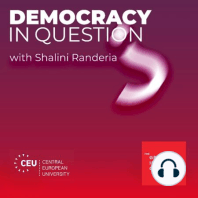26 min listen
Freedom of Expression in an Unequal World
ratings:
Length:
33 minutes
Released:
Feb 9, 2022
Format:
Podcast episode
Description
Guests featured in this episode:Irene Kahn, the first woman to ever hold the mandate of UN Special Rapporteur for Freedom of Opinion and Expression. Previously, Irene was Secretary-General of Amnesty International (2001-2009) and Director-General of the InternationalDevelopment Law Organization (2010 to 2019). Democracy in Question? is brought to you by:• Central European University: CEU• The Albert Hirschman Centre on Democracy in Geneva: AHCD• The Podcast Company: Novel Glossary for this episode...Who is Maria Ressa? (00:5:22 or p.2 in the transcript) Maria Ressa, in full Maria Angelita Ressa, Filipino-American journalist who, through Rappler, the Manila-based digital media company for investigative journalism that she cofounded, became known for detailing the weaponization of social media and for exposing government corruption and human rights violations. Her reporting led to a backlash from the Philippine government, and Ressa, who holds dual citizenship, became an international symbol of the fight for freedom of the press in hostile circumstances. With Russian journalist Dmitry Muratov, she was awarded the 2021Nobel Peace Prize, cited for using “freedom of expression to expose abuse of power, use of violence, and growing authoritarianism in her native country.” Source What was the insurrection of Capitol Hill in 2021? (00:6:02 or p.2 in the transcript) United States Capitol attack of 2021, storming of the United States Capitol on January 6, 2021, by a mob of supporters of Republican President Donald J. Trump. The attack disrupted a joint session of Congress convened to certify the results of the presidential election of 2020, which Trump had lost to his Democratic opponent, Joe Biden. Because its object was to prevent a legitimate president-elect from assuming office, the attack was widely regarded as an insurrection or attempted coup d’état. The FBI and other law-enforcement agencies also considered it an act of domestic terrorism. For having given a speech before the attack in which he encouraged a large crowd of his supporters near the White House to march to the Capitol and violently resist Congress’s certification of Biden’s victory—which many in the crowd then did—Trump was impeached by the Democratic-led House of Representatives for “incitement of insurrection” (he was subsequently acquitted by the Senate). Source What is the Facebook Oversight Board? (00:18:49 or p.4 in the transcript) The Oversight Board was created to help Facebook answer some of the most difficult questions around freedom of expression online: what to take down, what to leave up, and why. The board uses its independent judgment to support people’s right to free expression and ensure those rights are being adequately respected. The board’s decisions to uphold or reverse Facebook’s content decisions will be binding, meaning Facebook will have to implement them, unless doing so could violate the law.The purpose of the board is to promote free expression by making principled, independent decisions regarding content on Facebook and Instagram and by issuing recommendations on the relevant Facebook company content policy.When fully staffed, the board will consist of 40 members from around the world that represent a diverse set of disciplines and backgrounds. These members will be empowered to select content cases for review and to uphold or reverse Facebook’s content decisions. The board is not designed to be a simple extension of Facebook’s existing content review process. Rather, it will review a select number of highly emblematic cases and determine if decisions were made in accordance with Facebook’s stated values and policies. Source What is a platform law? (00:21:06 or p.5 in the transcript) The internet would seem to be an ideal platform for fostering norm diversity. The very structure of the internet resists centralized governance, while the opportunities it provides for the “long tail” of expression means even voices with extremely sma
Released:
Feb 9, 2022
Format:
Podcast episode
Titles in the series (78)
‘Soft authoritarianism’, a new face of electoral democracy? by Democracy in Question?
